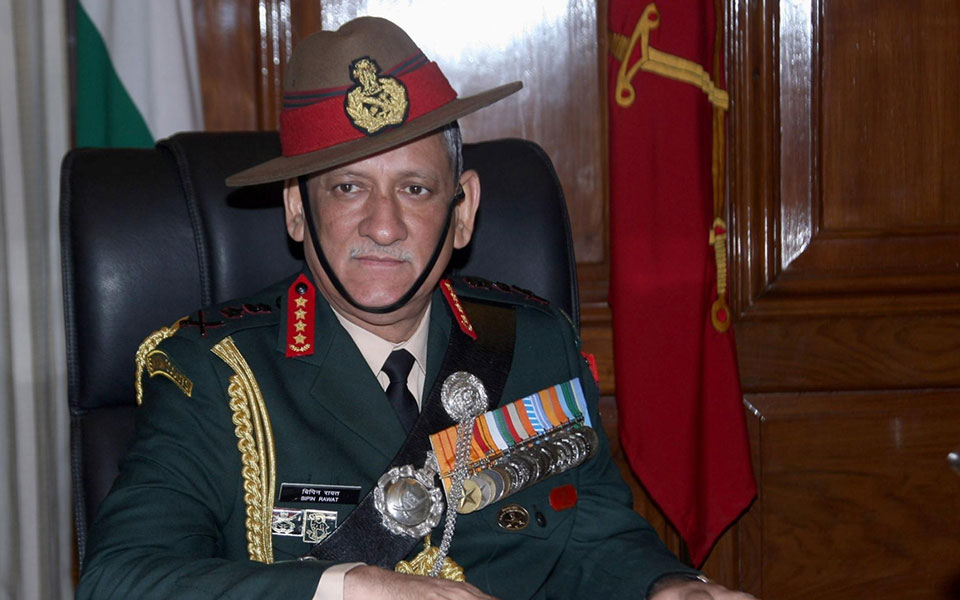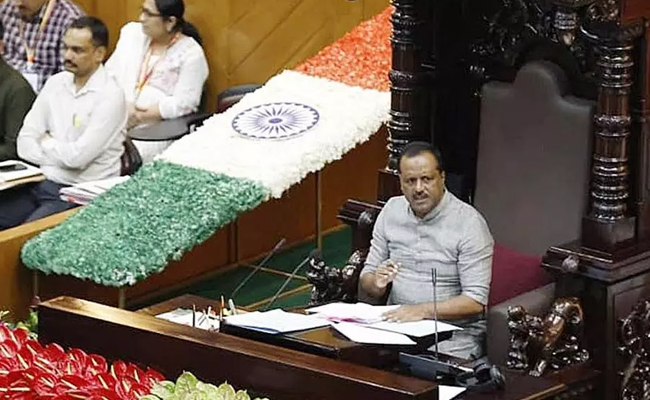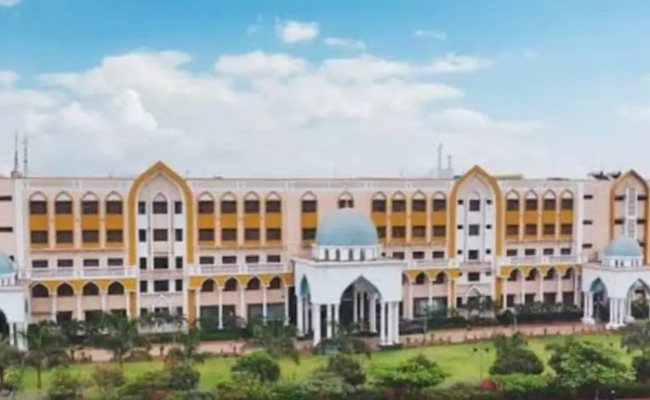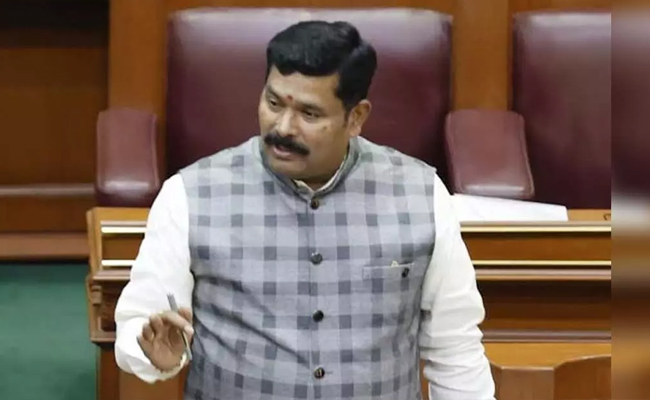New Delhi, Sep 4 : Indian Army Chief General Bipin Rawat, who doesnt carry a cellphone, on Tuesday said soldiers could not be denied access to the social media and they should be allowed to use smartphones within a line of controlled discipline.
He said the Indian Army needed to make optimal usage of the social media in the advanced age of communication and information.
"The social Media gaining momentum faster than we thought. (If we don't catch up) we will be left far behind and we will be fire fighting again," General Rawat said, speaking at a seminar on "Social Media and Armed Forces".
"Information is one of the pillars of national power. There is no way the Armed Forces can remain away from that," he said
"We have received advice that we should advise our soldiers to stay away from the social media. Can you deny a soldier a smart phone? Can you deny soldier a smartphone at home or prevent his family to own one. If you can't prevent usage of smartphone, it is best to allow it (the access to social media).
"The social media is here to stay. Soldiers will use the social media. Our adversary will use the social media for psychological warfare and deception. We must leverage it to our advantage."
The Army Chief said the social media could be used in combating proxy war, cross-border terrorism but drew a note of caution, saying it was "important to have means of imposing discipline" among the soldiers regarding their social media behaviour.
He, however, said he himself didn't possess a cellphone but that should not mean that his force should be denied of it.
"I don't have a cellphone and when someone asks me my cellphone number I just give them (any random number) 9868… and if it turns out to be an 11-digit number I just say cut the last digit.
"But we (the Indian Army) have to engage, remain engaged and benefit (from the use of social media).
"In modern day warfare, information warfare is important and within it, we have started talking about Artificial Intelligence. If we have to leverage Artificial Intelligence to our advantage, we must engage through the social media as a lot of what we wish to gain as part of Artificial Intelligence will come via social media."
The views by the Army Chief came months after the social media policy for soldiers was criticized when a senior Army officer was allegedly honey-trapped by an ISI agent through Facebook.
The Defence Ministry set out guidelines for the soldiers on the usage of the social media. They have been asked not to use photos in uniform as profile pictures on WhatsApp, Facebook or any other platforms.
The guidelines also bar them from clicking on advertisements on social media sites alluring for prizes/awards, exposing official identity, revealing their rank, unit name and location or anything related to their work, accepting friend request from unknown users.
Let the Truth be known. If you read VB and like VB, please be a VB Supporter and Help us deliver the Truth to one and all.
Kolkata (PTI): Thousands braved the December chill and waited past midnight to give a rousing welcome to Argentine superstar footballer Lionel Messi as he arrived in Kolkata for his whirlwind three-day, four-city GOAT India Tour 2025.
The Barcelona legend's 2.26 am touchdown in the early hours of Saturday sent the city into a frenzy. Gate 4 of the international arrivals turned into a roaring sea of chants, flags and flashing phones, with fans sprinting between gates for even a fleeting glimpse of their favourite star.
Children perched on shoulders and drums rolled as Messi was whisked out through the VIP gate under massive security. A heavy convoy then escorted him to his hotel, where another huge crowd was waiting deep into the night.
Barricades, police deployment, and non-stop cheering completed a citywide eruption of "Messi mania."
Messi arrived with long-time strike partner Luis Suárez and Argentina teammate Rodrigo De Paul. Over the next 72 hours, he will zip across Kolkata, Hyderabad, Mumbai and Delhi, meeting chief ministers, corporate leaders, Bollywood celebrities and eventually Prime Minister Narendra Modi on Monday.
Sleepless wait ends in disappointment
========================
Despite keeping vigil through the night, the wait ended in disappointment for many fans as they could not catch a glimpse of their icon.
Heavy security meant Messi was whisked out of the airport and taken to his hotel around 3.30 am through a back entrance, giving hundreds of waiting supporters a complete miss.
Only a handful of lucky airport staff managed a fleeting glimpse of the Argentine superstar as he stepped off the private Gulfstream V, looking dapper in a black suit over a white T-shirt, before being driven straight off the tarmac.
The Hyatt Regency lobby turned chaotic as fans sprinted across corridors shouting "Messi! Messi!" that echoed well past dawn.
The lobby resembled an Argentine fan club, dotted with sky-blue jerseys, scarves and flags. Breast-feeding infants clung to mothers, children raced around, and exhausted supporters sank into lobby sofas as the frenzy built up.
Messi checked into Room 730, with the entire seventh floor sealed off to ensure no movement around his suite.
With security at its peak, some fans who could afford it booked rooms in the hotel to stay as close to Messi as possible.
A family from New Alipore checked in a day early just so that their son, Krish Gupta, a Cristiano Ronaldo fan, would not miss a Messi moment.
"I'm a die-hard Ronaldo fan, so what? His biggest rival is coming to my city and I cannot miss the moment. So we planned to stay in the hotel a day in advance," said Krish, a Class 9 student of Birla High School.
He roamed the coffee shop with his mother and elder sister, anxious for a peek at the icon.
"I just want to tell him to play football with me. And if I'm not successful, I will go to the gym tomorrow morning to catch a glimpse of him. I have my autograph book ready and hopefully I will get a selfie."
High hopes
========
Satadru Dutta, the sole promoter of the tour who received Messi at the airport, said the moment was historic for Kolkata.
"In 2011, he had come after becoming the captain, but now he is coming after winning the World Cup and his eighth Ballon d'Or. So, this is really special. I don't think he will come again, so it's about celebration," Dutta told reporters.
He said Messi's presence could give Indian football a real push.
"Never ever have so many sponsors come together for a football star. You can say this is for Messi, but even if 10 per cent of that money comes to the development of Indian football, it would be very big. This statue that has come up and will be unveiled in the morning is also the first-of-its-kind in the world. Messi is set to leave a legacy behind this time," he added.
Security was tightened across the city ahead of Messi's GOAT India Tour, with policemen at every crossing, sniffer dogs checking vehicles and heightened surveillance around the hotel.
Staff were busy preparing the themed decor, including two large three-layered fondant cakes in Christmas colours.
Outside the airport and later near the hotel, massive crowds braved the winter chill to welcome Messi.
Fans waved Argentina flags and jerseys, screamed his name and broke into chants as emotions ran high, some clapping, some crying, many overwhelmed at witnessing a once-in-a-generation legend in their city.
The Hyatt Regency became the epicentre of the frenzy, with street vendors selling scarves, flags and Messi No 10 jerseys.
A few fans turned up in wigs and full Argentine colours. "This is a lifetime opportunity. We will not sleep tonight and will head straight to the stadium in the morning. Today is celebration day," said one fan.
The Itinerary
=========
Messi begins his GOAT India Tour on Saturday with a sponsors' meet-and-greet before heading to the Salt Lake Stadium for a tribute programme featuring music, dance and an exhibition match between Mohun Bagan 'Messi' All Stars and Diamond Harbour 'Messi' All Stars.
He is scheduled to arrive at 10.50 am for interactions with both teams, a felicitation of Bengal's Santosh Trophy-winning side and a "Master Class with Messi" for kids. Luis Suárez, Rodrigo De Paul and Shah Rukh Khan will join the proceedings, with Chief Minister Mamata Banerjee and other dignitaries invited.
Messi will take a lap of honour before a virtual unveiling of his 70-foot statue at Lake Town.
He will then depart for Hyderabad at 2.05 pm for the evening leg at the Rajiv Gandhi Stadium, featuring a short exhibition match, a five-minute appearance by Telangana Chief Minister Revanth Reddy, a football clinic and felicitation.
He then heads to Mumbai for his event at the Wankhede. The leg will also feature a 45-minute philanthropic fashion event with Suárez and De Paul, preceded by a Padel Cup at the CCI.
The tour ends in Delhi where Messi will meet Prime Minister Narendra Modi. Minerva Academy's triple youth-trophy winners will be felicitated, followed by a nine-a-side celebrity match.
Kolkata's tryst with footballers
===================
Kolkata's bond with football royalty dates back to 1977 when Pele's New York Cosmos played a 2-2 draw against Mohun Bagan at Eden Gardens.
Pele returned in 2015 to greet the class of '77, telling the crowd: "You can never have another Pele."
Brazil's Dunga, Bebeto and Mauro Silva, and Colombia's René Higuita who showcased his scorpion-kick saves in 2012 all drew big turnouts. German great Oliver Kahn's 2008 farewell match at Salt Lake Stadium pulled more than one lakh spectators.
But no one stirred the city like Diego Maradona, whose 2008 and 2017 visits saw near-unprecedented crowds line the streets and stadiums. Uruguay's Diego Forlán, fresh from his Golden Ball win, received a similarly rousing welcome in 2010.
Then in 2011, Messi had visited the city captaining Argentina for the first time on foreign soil, leading them to a 1-0 win over Venezuela in an FIFA international friendly before a packed Salt Lake Stadium.





